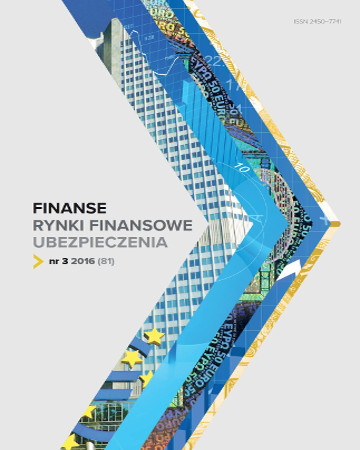
ISSN: 2450-7741
eISSN: 2300-4460
OAI
DOI: 10.18276/frfu.2017.87/2-01


Issue archive /
3/2017
Jakość systemów podatkowych a ich wydajność fiskalna
(THE QUALITY OF TAX SYSTEMS AND THEIR PERFORMANCE)
| Authors: |
Adam
Adamczyk
Uniwersytet Szczeciński Sławomir Franek Uniwersytet Szczeciński, Wydział Nauk Ekonomicznych i Zarządzania |
| Keywords: | tax rules efficiency quality |
| Data publikacji całości: | 2017 |
| Page range: | 9 (7-15) |
Abstract
Abstract: Purpose – The purpose of the article is to answer the question of whether it is possible to increase
fiscal performance of tax systems without increasing their repression.
Design/methodology/approach – A panel data model will be used to answer this research question.
Findings – The results obtained have led us to conclude that fiscal efficiency of taxation systems can be improved
by improving their quality, and in particular by reducing the cost of collection and increasing tax justice as
measured by the Reynolds-Smolensky index.
Originality/value – In previous studies of factors determining the fiscal performance of tax systems, the quality
measures of these systems were not taken into account.
Download file
Article file
Bibliography
| 1. | Aasness, J., Benedictow, A., Hussein, M.F. (2002). Distributional Efficiency of Direct and Indirect Taxes. Oslo. |
| 2. | Alonso,J.A., Garcimartín, C. (2011). Does Aid Hinder Tax Efforts? More Evidence. CREDIT Research Paper, 11 (4). |
| 3. | Bahl, R., Wallace, S. (2005). Public financing in developing and transition countries. Public Budgeting & Finance, 25 (4), 83–98. |
| 4. | Bird R.M., Martínez-Vázquez, J., Torgler, B.(2008). Tax effort in developing countries and high income countries: the impact of corruption voice and accountability. Economic Analysis and Policy, 38 (1), 55–71. |
| 5. | Cassou, S.P. (1997). The link between tax rates and foreign direct investment. Applied Economics, 29 (10), 1295–1301. |
| 6. | Castro, G., Camarillo, D. B. (2014). Determinants of tax revenue in OECD countries over the period 2001–2011. Contaduría y Administración, 59 (3), 35–59. |
| 7. | Dioda, L. (2012). Structural determinants of tax revenue in Latin America and the Caribbean, 1990–2009. Mexico: ECLAC. |
| 8. | Gajl, N. (1986). Finanse i prawo finansowe. Warszawa: PWN. |
| 9. | Gupta, A.S. (2007). Determinants of tax revenue efforts in developing countries. Working Paper No. 07/184, International Monetary Fund. |
| 10. | Heady, Ch. (1993). Optimal Taxation as a Guide to Tax Policy: A Survey. Fiscal Studies, 14 (1), 15–41. |
| 11. | Karagöz, K. (2013). Determinants of tax revenue: does sectorial composition matter? Journal of Finance, Accounting and Management, 4 (2), 50–63. |
| 12. | Kneiser, Th.J., Ziliak, J.P. (2002). Tax Reform and Automatic Stabilization. The American Economic Review, 92 (36), 590–612. |
| 13. | Lambert, P.J., Nesbakken, R., Thoresen, T.O. (2015). A common base answer to “Which country is most redistributive”? Discussion Papers, 811, Statistics Norway. |
| 14. | Martín-Mayoral, F., Uribe, C.A. (2010). Determinantes económicos e institucionales del esfuerzo fiscal en América Latina. Investigación Económica, LXIX (273), 85–113. |
| 15. | Nishiyama, S., Smetters, K. (2005). Consumption Taxes and Economic Efficiency with Idiosyncratic Wage Shocks. Journal of Political Economy, 113 (5), 1088–1150. |
| 16. | Niesiobędzka, M. (2009). Relacje państwo–podatnik jako predyktory moralności podatkowej. Psychologia Społeczna, 43 (11), 123–132. |
| 17. | Pączkowska, A, Walczak, M. (2015). Polski system podatkowy w kontekście zasad podatkowych A. Smitha. W: J. Ostaszewski (red.), O nowy ład finansowy w Polsce. Rekomendacje dla animatorów życia gospodarczego, Warszawa: SGH. |
| 18. | Pessino, C., Fenochietto, R. (2010). Determining countries’ tax effort. Revista de Economía Pública, 195 (4), 65–87. |
| 19. | Piancastelli, M. (2001). Measuring tax effort of developed and developing countries: cross country panel data analysis 1985–1995. Working Paper No. 818, Institute of Applied Economic Research. |
| 20. | Reynolds, M., Smolensky, E. (1977). Public Expenditures, Taxes, and the Distribution of Income: The United States, 1950, 1961, 1970. New York: Academic Press. |
| 21. | Tax Reforms in EU Member States 2015: Tax policy challenges for economic growth and fiscal sustainability (2015). Luxembourg: Publications Office of the European Union. |
| 22. | Verbist, G., Figari, F. (2014).The Redistributive Effect and Progressivity of Taxes Revisited: An International Comparison across the European Union. FinanzArchiv: Public Finance Analysis, 70 (3), 405–420. |